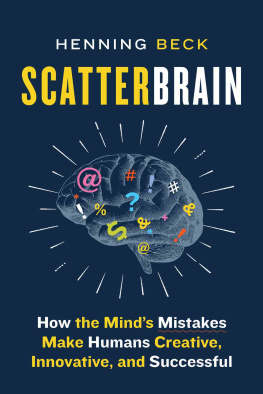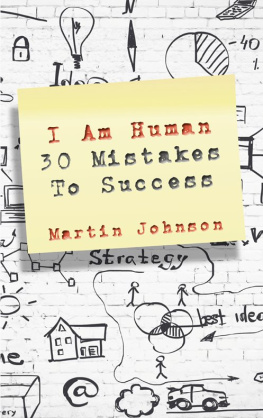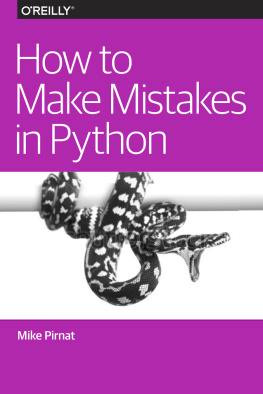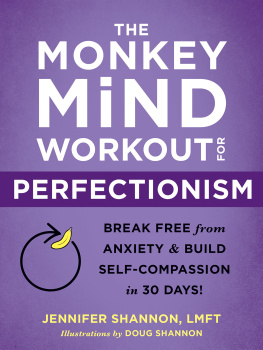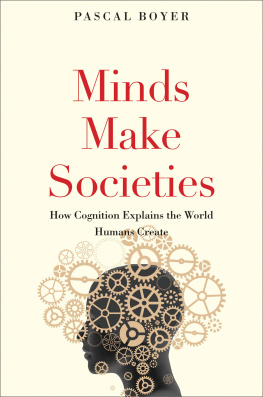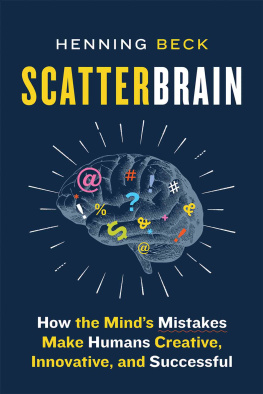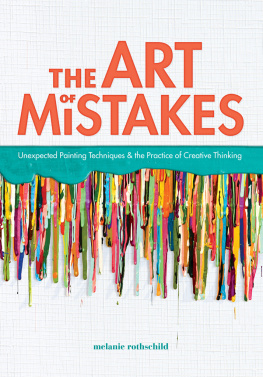Henning Beck - Scatterbrain: How the Minds Mistakes Make Humans Creative, Innovative, and Successful
Here you can read online Henning Beck - Scatterbrain: How the Minds Mistakes Make Humans Creative, Innovative, and Successful full text of the book (entire story) in english for free. Download pdf and epub, get meaning, cover and reviews about this ebook. year: 2019, publisher: Greystone Books, genre: Religion. Description of the work, (preface) as well as reviews are available. Best literature library LitArk.com created for fans of good reading and offers a wide selection of genres:
Romance novel
Science fiction
Adventure
Detective
Science
History
Home and family
Prose
Art
Politics
Computer
Non-fiction
Religion
Business
Children
Humor
Choose a favorite category and find really read worthwhile books. Enjoy immersion in the world of imagination, feel the emotions of the characters or learn something new for yourself, make an fascinating discovery.
- Book:Scatterbrain: How the Minds Mistakes Make Humans Creative, Innovative, and Successful
- Author:
- Publisher:Greystone Books
- Genre:
- Year:2019
- Rating:4 / 5
- Favourites:Add to favourites
- Your mark:
- 80
- 1
- 2
- 3
- 4
- 5
Scatterbrain: How the Minds Mistakes Make Humans Creative, Innovative, and Successful: summary, description and annotation
We offer to read an annotation, description, summary or preface (depends on what the author of the book "Scatterbrain: How the Minds Mistakes Make Humans Creative, Innovative, and Successful" wrote himself). If you haven't found the necessary information about the book — write in the comments, we will try to find it.
Henning Beck: author's other books
Who wrote Scatterbrain: How the Minds Mistakes Make Humans Creative, Innovative, and Successful? Find out the surname, the name of the author of the book and a list of all author's works by series.
Scatterbrain: How the Minds Mistakes Make Humans Creative, Innovative, and Successful — read online for free the complete book (whole text) full work
Below is the text of the book, divided by pages. System saving the place of the last page read, allows you to conveniently read the book "Scatterbrain: How the Minds Mistakes Make Humans Creative, Innovative, and Successful" online for free, without having to search again every time where you left off. Put a bookmark, and you can go to the page where you finished reading at any time.
Font size:
Interval:
Bookmark:


Copyright 2019 by Henning Beck
Translation copyright 2019 by Becky L. Crook
Originally published in Germany by Hanser as Irren ist ntzlich: Warum die
Schwchen des Gehirns unsere Strken sind in 2017
19 20 21 22 23 5 4 3 2 1
All rights reserved. No part of this book may be reproduced, stored in a retrieval system or transmitted, in any form or by any means, without the prior written consent of the publisher or a license from The Canadian Copyright Licensing Agency (Access Copyright). For a copyright license, visit accesscopyright.ca or call toll free to 1-800-893-5777.
Greystone Books Ltd.
greystonebooks.com
Cataloguing data available from Library and Archives Canada
ISBN 978-1-77164-401-3 (cloth)
ISBN 978-1-77164-402-0 (epub)
Editing by Heather Wood
Proofreading by Jennifer Stewart
Jacket and text design by Belle Wuthrich
Jacket illustration by istockphoto.com
Greystone Books gratefully acknowledges the Musqueam, Squamish, and Tsleil-Waututh peoples on whose land our office is located.
Greystone Books thanks the Canada Council for the Arts, the British Columbia Arts Council, the Province of British Columbia through the Book Publishing Tax Credit, and the Government of Canada for supporting our publishing activities.

CONTENTS
INTRODUCTION
THIS IS NOT a book that describes how great the brain works. At least, not at first glance. Its also not a book about how perfectly the brain works. Because it doesnt.
And if, after reading this book, you are hoping to improve your brains ability to think or concentrate, Im afraid I have to nip that notion in the bud right from the start. Thats not going to happen either because the brain is anything but precise or good at calculating. Its a dreamy scatterbrain, often distracted and unfocused, never one hundred percent reliable; it miscalculates, is frequently inaccurate, and forgets more than it retains. In short, the brain is an approximately 3.3 pound mistake. You carry this head full of sloppy blunders around with you wherever you goand I would like to congratulate you for that.
Now that Ive been permitted to scare most of my readers off, I would like to let you know that there is, in fact, a reason to continue reading this book. I mean to show you that it is precisely these seemingly inefficient imperfections and bloopers that help your brain to be so exceptional and successful.
We are all familiar with this from our own lives. The brain makes mistakessometimes big ones, sometimes small ones, and not a day goes by that our brain doesnt concoct some foolishness, misjudgment, or just plain messes up. You underestimate the time, forget what it was you were just reading, or allow yourself to get distracted by your mobile phone. And this is a great thing. Because these supposed weaknesses and imperfections are what make your brain so adaptable, dynamic, and creative.
Do you think I am exaggerating? All right then, lets test your mental abilities:
Imagine youre in a race and you overtake the guy in fourth place. What is your position now?
Third place?
Well, nobut dont worry. Your brain easily creates mental boxes (see ). Never mind. Literally. Even simple addition can get complicated. How often is the letter M repeated in the next line?
MMMMMMMMMMMMMMMMMMMMMMMMMMM
Enough hemming and hawing. Its not quite as easy as it seems, is it? What this shows us is that the brain doesnt seem geared toward processing pieces of information that are indistinguishable from each other. On the contrary, it often gets bogged down with such information.
Making mistakes is what makes us tough, so making just one is never enough, my chemistry teacher once said. And then he proceeded to ignite silver acetylide and blew a crater in the schoolyard. Take note: trial and error is not always the method of choice. Sometimes it is, however, as exemplified by my neighbor. My neighbor is a truly extraordinary character. At two years old, he is already a pretty clever guy with the ability to master things that would bring any supercomputer to its knees. He is able, for instance, to identify his mothers face among a crowd of people and be aware of his own reflection in a mirror. After playing only a single time with a toy car, he knows what a car is. He can point out smoke detectors on the ceiling and thinks potatoes are yummytasks which no modern computer could undertake. At the same time, he is constantly making little mistakes. He could barely walk without stumbling a few months ago, his movements are clumsy, his speech fragmented, and he sleeps for more than half of the dayduring which time he is completely inoperable. It would be enough to make an engineer put his head in his hands: What a defective design. Two years old and it still doesnt run smoothly. A bit like a Windows operating system.
Nonetheless, my neighbor is making tremendous progress day by day, at a pace unmatched by any calculator. Every mistake, every imprecision is an incentive for him to try it differently next time and maybe even to get a little bit better. His brain is anything but perfectand it never will be. Over time, it will of course improve at adapting to its environment, but it will never be immaculate and absolute because it will always retain its ability to err. Only someone who builds mistakes into their actions will be able, at some point, to develop something innovative and new. Whoever attempts to always think as correctly as possible, by contrast, puts themselves on the level of a computer: efficient, precise, and speedybut also uncreative, boring, and predictable.
As adults, we develop an even more obvious form of intellectual drivel. We forget names and faces. We allow ourselves to become easily distracted by WhatsApp messages or lose our plan for the day in the flood of distracting morning emails. We have names on the tip of our tongues that dont ever fully come to us. We misjudge the time as poorly as we do probabilities or numbers. We struggle to choose from among several options. We go blank right before we are supposed to speak in front of an audience. We find it hard to quiet our minds after an exhausting day at work and are the worst at retaining information and learning under pressure.
On the other hand, there is no organ or system, let alone a computer, that is able to solve complicated problems as playfully as we can: 35 x 27 = ?thats tough without a calculator. But are you able to recognize the latest Taylor Swift song? No big deal, right? Though the above math problem is relatively simple, we can barely solve it in our heads, and yet we can immediately recognize a song, the face of a loved one, or their voice. And we can do this even though it technically takes much more effort to recognize a certain singer on the stage.
It seems as though our brain is particularly bad at carrying out those tasks that are particularly in demand in our current technical and digital world. We want optimization and precisionperfection. But our brain? It does exactly the opposite, eluding this goal. A lot of people imagine how wonderful it might be if the brain functioned like a mistake-free computer. How concentrated, quick, and efficient we would be at solving problems! And its true: computers dont make mistakes, and if they do, they crash. But brains dont crash (unless there is outside help, but thats another story). This is because the brain works in a completely different way. It is our errors and our inaccuracies in thinking that, in fact, make us superior to computers. All of the horror stories predicting that computers will soon seize the world, leaving us behind in their intellectual shadow, are clearly rejected by biology. In fact, biology seems to contradict the trend of digitalization, that buzzword of our modern times that seems to want school classes networked like businesses, data exchanged and efficiently analyzed. Classrooms of the Future, Analyzing Big Data, Deep Learningthere is no area of our lives that we dont wish to optimize with the computational power of the machine. The grand ideas of the future, however, will not come from digital, but rather from analog thinking. From brains, not smartphones. Computers might learn thingsbut we understand them. Computers follow the ruleswe can change them.
Font size:
Interval:
Bookmark:
Similar books «Scatterbrain: How the Minds Mistakes Make Humans Creative, Innovative, and Successful»
Look at similar books to Scatterbrain: How the Minds Mistakes Make Humans Creative, Innovative, and Successful. We have selected literature similar in name and meaning in the hope of providing readers with more options to find new, interesting, not yet read works.
Discussion, reviews of the book Scatterbrain: How the Minds Mistakes Make Humans Creative, Innovative, and Successful and just readers' own opinions. Leave your comments, write what you think about the work, its meaning or the main characters. Specify what exactly you liked and what you didn't like, and why you think so.

